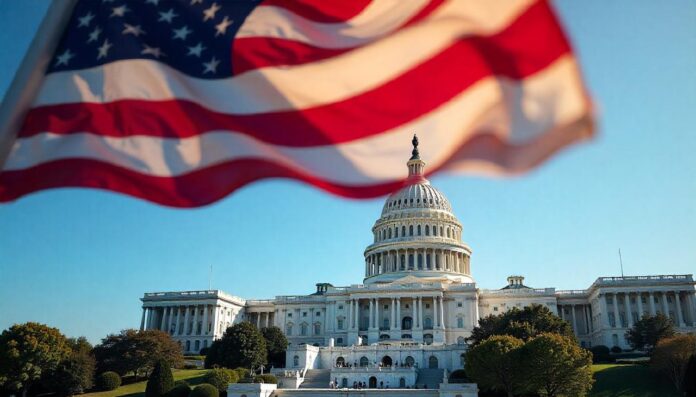
A group of Republican senators, led by Cynthia Lummis, introduced a regulatory framework that seeks to establish the United States as a global leader in digital asset regulation.
Cynthia Lummis, Tim Scott, Thom Tillis, and Bill Hagerty have presented a set of legislative principles that seek to transform the United States into the world's leading power in digital asset regulation.
The initiative, which comes at a key moment, focuses on establishing a clear and reliable legal framework that fosters a more secure, competitive, and attractive market for the digital industry, ensuring that the United States not only maintains its technological leadership but also becomes a global benchmark in the digital ecosystem.
With this proposal, the group of senators seeks to counter the progress made in other regions, such as Europe and Singapore, which are establishing clear regulatory frameworks for cryptocurrencies capable of attracting innovation and capital. Thus, the legislators are positioning themselves to close the regulatory gap that has hindered crypto development in the country and lay the foundation for a more secure, competitive, and attractive market for the digital industry.
BUY BITCOIN FAST AND SAFESenators seek to lead crypto regulation in the United States
Senators Lummis, Scott, Tillis, and Hagerty have joined forces to introduce a set of principles aimed at structuring the digital asset market in the United States. This proposal It emerges in a context where US crypto regulation has lagged behind that of Europe and Singapore, countries that have made rapid progress in creating legal frameworks that encourage innovation and protect users.
Therefore, the intention of these legislators is clear: for the United States to stop being a spectator and become a major player in the global crypto industry.
According to the senators, the initiative seeks precisely define which cryptoassets should be considered securities and which commodities, a fundamental aspect for providing legal certainty to investors and companies. This is vital, they point out, to avoid the uncertainty that has hindered the development of the sector in the country and to attract greater investment and technological development.
Senate Banking Committee Chairman Tim Scott said this proposal builds on the success of the GENIUS Act, a stablecoin legislation co-authored by Senator Hagerty with Banking Committee Chairman Tim Scott and Senator Lummis.
Following the passage of this law in the Senate and its anticipated approval in the House of Representatives, Scott stated that “The United States is one step closer to becoming the cryptocurrency capital of the world.”Based on this, he points out that the new principles for market structure represent the next crucial step on that path, consolidating a regulatory framework that can boost the country's confidence and competitiveness in the global digital ecosystem.
GENIUS: The US's decisive step toward responsible crypto regulation
The GENIUS Act has been a milestone in US crypto regulation, especially with regard to stablecoins, cryptocurrencies pegged to traditional assets like the dollar. This legislation establishes clear rules for their issuance and oversight, which is critical to avoiding systemic risks and protecting consumers without stifling innovation. The co-authorship of this legislation by Senator Hagerty, Chairman Scott, and Senator Lummis demonstrates the Republican commitment to advancing responsible regulation of the sector.
Cynthia Lummis, known for her enthusiastic support of cryptocurrencies, chairs the Senate Banking Committee's digital assets subcommittee and has expressed her expectation that both the GENIUS Act and the CLARITY Act, which seeks to clarify the structure of the digital asset market, will be passed before the end of the year.
Lummis has indicated That the United States urgently needs legislation that promotes responsible innovation and protects consumers, preventing the country from losing ground to other jurisdictions that have already established strong regulatory frameworks.
The senator has also emphasized the importance of a bipartisan legislative process, although she acknowledges the challenges this entails due to domestic political concerns. However, the growing acceptance of these laws by some Democrats is a positive sign for their passage. The clear and balanced regulations proposed by these senators seek to incentivize the adoption of blockchain technologies and digital assets, while establishing limits and protections to prevent potential abuse and fraud.
Use crypto with confidence and securityThe United States seeks regulatory clarity to boost crypto innovation.
While Europe and Singapore are moving forward with regulations that have attracted crypto companies and projects, the United States has faced regulatory uncertainty that has generated concern in the industry. The lack of a clear framework has caused many startups and large companies to consider other, friendlier jurisdictions for their operations. This affects the country's competitiveness and limits the potential for innovation and economic development that digital assets can offer.
The Republican senators' proposal responds to this urgent need. By clearly defining which digital assets will be regulated as securities and which as commodities, it seeks to avoid the ambiguity that has characterized the US regulatory stance until now. This clarity is key to enabling businesses to operate with confidence, attract investment, and protect consumers.
Furthermore, the proposed legislation contemplates promoting responsible innovation, which requires a balance between facilitating technological development and ensuring legal and financial security. This approach is crucial for the United States to regain ground and lead the next stage of the global digital financial revolution.
Heading to the cryptocurrency capital of the world
If these laws are passed, the United States could position itself as the cryptocurrency capital of the world, consolidating its technological leadership and influence in defining global standards for this booming sector. Clear and effective regulation will not only attract companies, investors, and developers, but will also foster a strong, competitive ecosystem full of opportunities.
The market proposal seeks to ensure transparency, consumer protection, and foster innovation—fundamental pillars for the sustainable growth of digital assets. In particular, the regulation of stablecoins under the GENIUS Act ensures that these financial instruments, increasingly used in digital transactions, operate within a legal framework that reduces systemic risks and strengthens trust.
In short, the initiative championed by Senators Scott, Lummis, Tillis, and Hagerty represents a decisive step toward enabling the United States to not only keep pace with other nations but also become a global leader in the regulation and development of digital assets, driving the digital economy of the future.
TRADE WITH STABLECOINS HERE

